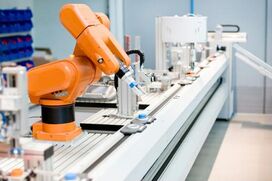
The past, present and future of the technology industry
As technology advanced, automation increased and processes became more streamlined, a significant group of the population cried foul. What will happen to the jobs that hard-working people once occupied, these naysayers argued, once robots and digital technology can perform those tasks more efficiently? In other words, many were worried that technology would replace human workers. It was a legitimate concern for a time, but the verdict is in: Technology has actually provided more jobs than it's taken away.
A study from Deloitte analyzed over 140 years' worth of census data beginning in England and Wales in 1871. The firm found that improved technology has consistently resulted in better job market conditions. Part of it was the increased spending power that technology provided which allowed more people to put their resources into the market - for example, bar staff has increased by around 400 percent since the 1950s.
"The dominant trend is of contracting employment in agriculture and manufacturing is being more than offset by rapid growth in the caring, creative, technology and business services sectors," the study authors wrote. "Machines will take on more repetitive and laborious tasks, but seem no closer to eliminating the need for human labor than at any time in the last 150 years."
"More automation and digital resources means a higher need for tech professionals."
That's good news for the job market at large, but especially the technological fields. More automation and digital resources means a higher need for professionals with expertise in programming, building, repairing and working with those systems.
IT jobs continue to thrive
If the Deloitte study spoke to the conditions that led to where we are today, the next logical question is, where are we today? According to a recent survey from non-profit trade associate CompTIA, the tech industry is doing quite well. Citing U.S. Labor Department statistics, the survey found the IT industry added over 70,000 jobs over the first half of 2015. Additionally, 14 of the last 18 months posted increases, with the largest spike in April 2015.
All the numbers point to the fact that more employers - even the smaller ones - are willing and able to hire IT staff, according to Tim Herbert, senior vice president of research and market intelligence at CompTIA.
"In some cases it may be employers that are in the small to medium-size business category and they may have had a very small IT department, but because technology is becoming more important to them, it's more of a driver of their business objectives, they now have moved beyond having an IT department of maybe two people to maybe four people," Herbert explained.

Future industries will require more jobs in technology
It's a difficult thing to predict where the jobs market will turn next - as has happened time and time again, new technology and information is often what drives employment. Even still, the jobs and processes that do exist still trend toward a high need for IT and technical talent.
Regional Vice PresidentBrian Pelligrini of Beacon Hill Staffing Group, as one of the leaders of the IT staffing division, understands the integral role that the human element plays in employment, even in the IT field. "It's a very exciting time to be in the world of IT staffing," Pelligrini says, "and it's been amazing to witness the continued growth of the industry, our company, my region and here in the Chicago market specifically."
"New trends and challenges seem to manifest themselves daily and will always be something we'll have to overcome, but time and again [we have] proven that having the right people and consistency in their mission will outlast and outperform any threats to our business."
Pacific Standard Magazine predicts that emergent industries such as driverless cars, working from home and personal care jobs will grow, each with a unique need for technological expertise. For driverless cars, the ability to program and build them will require a technologically skilled workforce. Working from home can't exist without a powerful network and an IT team capable of troubleshooting it at any time. As for personal care, telecommuting technology can bring better one-on-one attention to more people in more parts of the country - something that also requires a tech-savvy crew.
This content is brought to you by the Marketing Team at Beacon Hill Staffing Group.
 Back to Top
Back to Top

